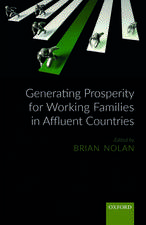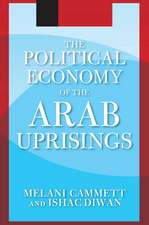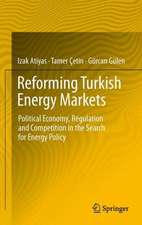Crony Capitalism in the Middle East: Business and Politics from Liberalization to the Arab Spring
Editat de Ishac Diwan, Adeel Malik, Izak Atiyasen Limba Engleză Hardback – 28 mai 2019
Preț: 765.01 lei
Preț vechi: 1031.57 lei
-26% Nou
Puncte Express: 1148
Preț estimativ în valută:
146.43€ • 159.11$ • 123.08£
146.43€ • 159.11$ • 123.08£
Carte tipărită la comandă
Livrare economică 10-16 aprilie
Preluare comenzi: 021 569.72.76
Specificații
ISBN-13: 9780198799870
ISBN-10: 019879987X
Pagini: 464
Dimensiuni: 165 x 241 x 32 mm
Greutate: 0.85 kg
Editura: OUP OXFORD
Colecția OUP Oxford
Locul publicării:Oxford, United Kingdom
ISBN-10: 019879987X
Pagini: 464
Dimensiuni: 165 x 241 x 32 mm
Greutate: 0.85 kg
Editura: OUP OXFORD
Colecția OUP Oxford
Locul publicării:Oxford, United Kingdom
Recenzii
...important collection
Notă biografică
Ishac Diwan is currently a Visiting Professor at SIPA - Columbia University. He holds the chair of the Socio-Economy of the Arab World at Paris Sciences et Lettres, a consortium of Parisian universities, and has held teaching positions at Harvard Kennedy School, Dauphine University, and New York University. He worked at the Work Bank for many years in the Research Complex, the Middle East and Africa departments, and the World Bank Institute. His work on international finance and on the Middle East is widely published. Professor Diwan directs the Political Economy program of the Economic Research Forum, an association of Middle East social scientists.Adeel Malik is Globe Fellow in the Economies of Muslim Societies at the Oxford Centre for Islamic Studies and a University Research Lecturer in Development Economics at the University of Oxford. He is also a Research Fellow in Economics at St. Peter's College, Oxford. Malik is trying to develop a broader research lens on political economy of the Middle East. His research articles have been published in Journal of Development Economics, Oxford Economic Papers, World Development, and Modern Asian Studies. His research on Middle Eastern political economy has featured in the CNN, New York Times, Project Syndicate, and Foreign Affairs.Izak Atiyas is an Associate Professor of Economics at Sabanci University, Istanbul, Turkey. He has worked as a senior economist at the World Bank in the Private Sector Development Department and at Bilkent University as visiting Assistant Professor of Economics. He has been with Sabanci University since 1998, and is also the Director of TUSiAD-Sabanci University Competitiveness Forum. His research areas include productivity, industrial policy, policy, political economy, regulation of network industries, and privatization.










